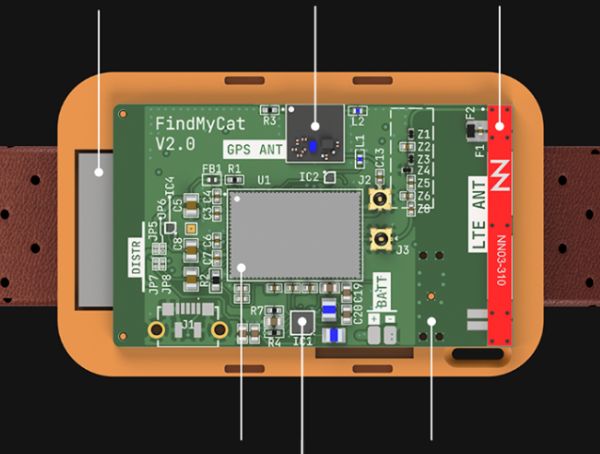Pet dogs are important members of many families, they not only bring joy and companionship, but also play a special role in life. According to the World Animal Foundation, in the United States alone, families with pets will account for 70% of all households in 2022, with 69 million families having at least one pet dog. For dog owners, the fear of losing a pet is real. According to a study by the Humane Society of the United States, approximately 10 million pets are lost each year, and only 15 to 20 percent of lost dogs are ever found. Fortunately, the pet industry has come up with an innovation – the GPS pet tracker – to help address concerns about missing pets.GPS trackers increase the chances of
What is a GPS tracker for dogs?
A GPS tracker is a device that utilizes Global Positioning System (GPS) technology to track your pet’s location in real time. Typically, they are designed to be small and lightweight to fit on a dog’s collar.GPS trackers connect to satellites and send real-time location coordinates to an application on the owner’s mobile device. This allows the owner to accurately monitor their pet’s location. The dog tracking collar combines GPS with radio signals or cellular networks to transmit this information.

The main functions of the dog GPS tracker
- real-time location: GPS tracker can provide real-time location of your pet dog to help owners find their pets quickly if they get lost.
- Activity monitoring: Some advanced GPS trackers also have activity monitoring function to record the pet’s daily activity level and health condition, which helps the owner to better understand the pet’s health condition.
- Geo-fencing: Owners can set up a virtual safety zone, when the pet dog exceeds this zone, the GPS tracker will sound an alarm to remind the owner to take timely action.
- History Track: Viewing the history of your pet dog’s activity track to understand their range of activities and habits throughout the day helps to better care and train your pet.
Although most dogs can be fitted with a GPS tracker, dog owners must consider the size and weight of the device in relation to the size and weight of the dog. This is due to the size of the GPS tracker and its battery. Owners must ensure that the GPS tracker is not too heavy or bulky for their dog to wear comfortably and safely.
Frequently Asked Questions About GPS Trackers for Dogs
What is the best GPS tracker for my pet?
The question of what is the best GPS tracker for pets is very subjective and depends on the specific needs of the pet owner. However, a model that offers a wide range of tracking and mapping features and has an operating range of 14.5 kilometers is considered one of the best options. When choosing a GPS dog tracker, it is advisable to do research and consider factors such as quality, durability, battery life and compatibility with the size and weight of the dog.
What is the market size of pet GPS trackers?
According to a report by Allied Market Research, the global pet tracker market size was $938.9 million in 2021 and is expected to grow at a CAGR of 10.3% to reach $2.6 billion by 2031.

Considerations for Choosing a Pet Dog GPS Tracker
A pet based GPS tracker is a useful tool for dog and other pet owners. Here are some important factors for buyers to consider when choosing one:
- Battery life: Pet GPS trackers require battery power to operate, and battery life can vary from device to device, with some trackers having a battery life of only a few days and others lasting weeks or months. Pet owners should be prepared to recharge or replace the battery as needed. 2.
- Loss of Signal: GPS signals can be weakened or blocked by physical barriers such as buildings, trees, and hills. This can result in loss of signal or inaccurate location data. In addition, some GPS trackers use cellular data to transmit location data, which may be affected by network coverage or signal strength. 3.
- Accuracy: GPS position data may be affected by factors such as satellite availability, signal strength, and environmental conditions. This may result in inaccurate position data.
- Size and Weight: GPS trackers come in a variety of sizes and weights, some of which may be too bulky or heavy for smaller pets. GPS trackers should be selected to fit the size and weight of the dog.
- Potential Discomfort or Injury: Some GPS trackers are attached to your pet’s collar or harness, which can cause discomfort or injury if the device is too heavy or improperly designed.
GPS tracker for pet dogs is an advanced and practical tool that brings great convenience and security to the life of pet owners. With the functions of real-time positioning, activity monitoring and geo-fencing, owners can keep track of their pet dogs and effectively prevent wandering and getting lost. When choosing and using a GPS tracker, paying attention to key factors such as battery life, waterproof performance and signal coverage can ensure the reliability and stability of the device. In short, GPS tracker for pet dogs is not only a good tool to ensure the safety of pets, but also a good helper for pet owners to be attentive.
For more information on HBOIOT and their advanced GPS trackers, visit HBOIOT‘s website.
